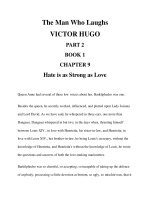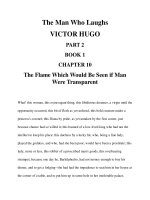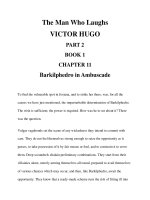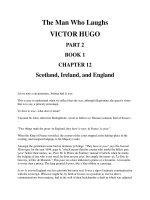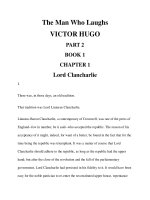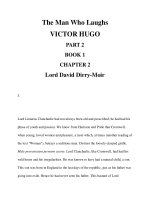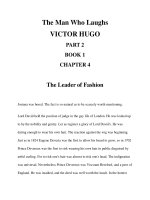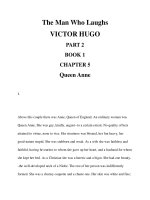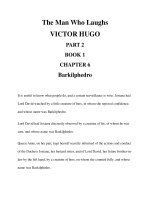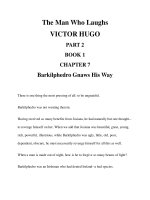The Man Who Laughs Victor Hugo Part 2 Book 8 Chapter 7 ppt
Bạn đang xem bản rút gọn của tài liệu. Xem và tải ngay bản đầy đủ của tài liệu tại đây (63.91 KB, 21 trang )
The Man Who Laughs
Victor Hugo
Part 2
Book 8
Chapter 7
Storms of Men are Worse than Storms of Oceans
The doors were closed again, the Usher of the Black Rod re-entered; the Lords
Commissioners left the bench of State, took their places at the top of the dukes'
benches, by right of their commission, and the Lord Chancellor addressed the
House:
"My Lords, the House having deliberated for several days on the Bill which
proposes to augment by £100,000 sterling the annual provision for his Royal
Highness the Prince, her Majesty's Consort, and the debate having been
exhausted and closed, the House will proceed to vote; the votes will be taken
according to custom, beginning with the puisne Baron. Each Lord, on his name
being called, will rise and answer content, or non-content, and will be at liberty
to explain the motives of his vote, if he thinks fit to do so Clerk, take the
vote."
The Clerk of the House, standing up, opened a large folio, and spread it open on
a gilded desk. This book was the list of the Peerage.
The puisne of the House of Lords at that time was John Hervey, created Baron
and Peer in 1703, from whom is descended the Marquis of Bristol.
The clerk called,
"My Lord John, Baron Hervey."
An old man in a fair wig rose, and said, "Content."
Then he sat down.
The Clerk registered his vote.
The Clerk continued,
"My Lord Francis Seymour, Baron Conway, of Killultagh."
"Content," murmured, half rising, an elegant young man, with a face like a
page, who little thought that he was to be ancestor to the Marquises of Hertford.
"My Lord John Leveson, Baron Gower," continued the Clerk.
This Baron, from whom were to spring the Dukes of Sutherland, rose, and, as he
reseated himself, said "Content."
The Clerk went on.
"My Lord Heneage Finch, Baron Guernsey."
The ancestor of the Earls of Aylesford, neither older nor less elegant than the
ancestor of the Marquises of Hertford, justified his device, Aperto vivere voto,
by the proud tone in which he exclaimed, "Content."
Whilst he was resuming his seat, the Clerk called the fifth Baron,
"My Lord John, Baron Granville."
Rising and resuming his seat quickly, "Content," exclaimed Lord Granville, of
Potheridge, whose peerage was to become extinct in 1709.
The Clerk passed to the sixth.
"My Lord Charles Montague, Baron Halifax."
"Content," said Lord Halifax, the bearer of a title which had become extinct in
the Saville family, and was destined to become extinct again in that of
Montague. Montague is distinct from Montagu and Montacute. And Lord
Halifax added, "Prince George has an allowance as Her Majesty's Consort; he
has another as Prince of Denmark; another as Duke of Cumberland; another as
Lord High Admiral of England and Ireland; but he has not one as Commander-
in-Chief. This is an injustice and a wrong which must be set right, in the interest
of the English people."
Then Lord Halifax passed a eulogium on the Christian religion, abused popery,
and voted the subsidy.
Lord Halifax sat down, and the Clerk resumed,
"My Lord Christopher, Baron Barnard."
Lord Barnard, from whom were to descend the Dukes of Cleveland, rose to
answer to his name.
"Content."
He took some time in reseating himself, for he wore a lace band which was
worth showing. For all that, Lord Barnard was a worthy gentleman and a brave
officer.
While Lord Barnard was resuming his seat, the Clerk, who read by routine,
hesitated for an instant; he readjusted his spectacles, and leaned over the register
with renewed attention; then, lifting up his head, he said,
"My Lord Fermain Clancharlie, Baron Clancharlie and Hunkerville."
Gwynplaine arose.
"Non-content," said he.
Every face was turned towards him. Gwynplaine remained standing. The
branches of candles, placed on each side of the throne, lighted up his features,
and marked them against the darkness of the august chamber in the relief with
which a mask might show against a background of smoke.
Gwynplaine had made that effort over himself which, it may be remembered,
was possible to him in extremity. By a concentration of will equal to that which
would be needed to cow a tiger, he had succeeded in obliterating for a moment
the fatal grin upon his face. For an instant he no longer laughed. This effort
could not last long. Rebellion against that which is our law or our fatality must
be short-lived; at times the waters of the sea resist the power of gravitation,
swell into a waterspout and become a mountain, but only on the condition of
falling back again.
Such a struggle was Gwynplaine's. For an instant, which he felt to be a solemn
one, by a prodigious intensity of will, but for not much longer than a flash of
lightning lasts, he had thrown over his brow the dark veil of his soul he held in
suspense his incurable laugh. From that face upon which it had been carved he
had withdrawn the joy. Now it was nothing but terrible.
"Who is this man?" exclaimed all.
That forest of hair, those dark hollows under the brows, the deep gaze of eyes
which they could not see, that head, on the wild outlines of which light and
darkness mingled weirdly, were a wonder indeed. It was beyond all
understanding; much as they had heard of him, the sight of Gwynplaine was a
terror. Even those who expected much found their expectations surpassed. It
was as though on the mountain reserved for the gods, during the banquet on a
serene evening, the whole of the all-powerful body being gathered together, the
face of Prometheus, mangled by the vulture's beak, should have suddenly
appeared before them, like a blood-coloured moon on the horizon. Olympus
looking on Caucasus! What a vision! Old and young, open-mouthed with
surprise, fixed their eyes upon Gwynplaine.
An old man, respected by the whole House, who had seen many men and many
things, and who was intended for a dukedom Thomas, Earl of Wharton rose in
terror.
"What does all this mean?" he cried. "Who has brought this man into the
House? Let him be put out."
And addressing Gwynplaine haughtily,
"Who are you? Whence do you come?"
Gwynplaine answered,
"Out of the depths."
And folding his arms, he looked at the lords.
"Who am I? I am wretchedness. My lords, I have a word to say to you."
A shudder ran through the House. Then all was silence. Gwynplaine continued,-
-
"My lords, you are highly placed. It is well. We must believe that God has His
reasons that it should be so. You have power, opulence, pleasure, the sun ever
shining in your zenith; authority unbounded, enjoyment without a sting, and a
total forgetfulness of others. So be it. But there is something below you above
you, it may be. My lords, I bring you news news of the existence of mankind."
Assemblies are like children. A strange occurrence is as a Jack-in-the-Box to
them. It frightens them; but they like it. It is as if a spring were touched and a
devil jumps up. Mirabeau, who was also deformed, was a case in point in
France.
Gwynplaine felt within himself, at that moment, a strange elevation. In
addressing a body of men, one's foot seems to rest on them; to rest, as it were,
on a pinnacle of souls on human hearts, that quiver under one's heel.
Gwynplaine was no longer the man who had been, only the night before, almost
mean. The fumes of the sudden elevation which had disturbed him had cleared
off and become transparent, and in the state in which Gwynplaine had been
seduced by a vanity he now saw but a duty. That which had at first lessened
now elevated him. He was illuminated by one of those great flashes which
emanate from duty.
All round Gwynplaine arose cries of "Hear, hear!"
Meanwhile, rigid and superhuman, he succeeded in maintaining on his features
that severe and sad contraction under which the laugh was fretting like a wild
horse struggling to escape.
He resumed,
"I am he who cometh out of the depths. My lords, you are great and rich. There
lies your danger. You profit by the night; but beware! The dawn is all-powerful.
You cannot prevail over it. It is coming. Nay! it is come. Within it is the day-
spring of irresistible light. And who shall hinder that sling from hurling the sun
into the sky? The sun I speak of is Right. You are Privilege. Tremble! The real
master of the house is about to knock at the door. What is the father of
Privilege? Chance. What is his son? Abuse. Neither Chance nor Abuse are
abiding. For both a dark morrow is at hand. I am come to warn you. I am come
to impeach your happiness. It is fashioned out of the misery of your neighbour.
You have everything, and that everything is composed of the nothing of others.
My lords, I am an advocate without hope, pleading a cause that is lost; but that
cause God will gain on appeal. As for me, I am but a voice. Mankind is a
mouth, of which I am the cry. You shall hear me! I am about to open before
you, peers of England, the great assize of the people; of that sovereign who is
the subject; of that criminal who is the judge. I am weighed down under the load
of all that I have to say. Where am I to begin? I know not. I have gathered
together, in the vast diffusion of suffering, my innumerable and scattered pleas.
What am I to do with them now? They overwhelm me, and I must cast them to
you in a confused mass. Did I foresee this? No. You are astonished. So am I.
Yesterday I was a mountebank; to-day I am a peer. Deep play. Of whom? Of the
Unknown. Let us all tremble. My lords, all the blue sky is for you. Of this
immense universe you see but the sunshine. Believe me, it has its shadows.
Amongst you I am called Lord Fermain Clancharlie; but my true name is one of
poverty Gwynplaine. I am a wretched thing carved out of the stuff of which the
great are made, for such was the pleasure of a king. That is my history. Many
amongst you knew my father. I knew him not. His connection with you was his
feudal descent; his outlawry is the bond between him and me. What God willed
was well. I was cast into the abyss. For what end? To search its depths. I am a
diver, and I have brought back the pearl, truth. I speak, because I know. You
shall hear me, my lords. I have seen, I have felt! Suffering is not a mere word,
ye happy ones! Poverty I grew up in; winter has frozen me; hunger I have
tasted; contempt I have suffered; pestilence I have undergone; shame I have
drunk of. And I will vomit all these up before you, and this ejection of all
misery shall sully your feet and flame about them. I hesitated before I allowed
myself to be brought to the place where I now stand, because I have duties to
others elsewhere, and my heart is not here. What passed within me has nothing
to do with you. When the man whom you call Usher of the Black Rod came to
seek me by order of the woman whom you call the Queen, the idea struck me
for a moment that I would refuse to come. But it seemed to me that the hidden
hand of God pressed me to the spot, and I obeyed. I felt that I must come
amongst you. Why? Because of my rags of yesterday. It is to raise my voice
among those who have eaten their fill that God mixed me up with the famished.
Oh, have pity! Of this fatal world to which you believe yourselves to belong you
know nothing. Placed so high, you are out of it. But I will tell you what it is. I
have had experience enough. I come from beneath the pressure of your feet. I
can tell you your weight. Oh, you who are masters, do you know what you are?
do you see what you are doing? No. Oh, it is dreadful! One night, one night of
storm, a little deserted child, an orphan alone in the immeasurable creation, I
made my entrance into that darkness which you call society. The first thing that
I saw was the law, under the form of a gibbet; the second was riches, your
riches, under the form of a woman dead of cold and hunger; the third, the future,
under the form of a child left to die; the fourth, goodness, truth, and justice,
under the figure of a vagabond, whose sole friend and companion was a wolf."
Just then Gwynplaine, stricken by a sudden emotion, felt the sobs rising in his
throat, causing him, most unfortunately, to burst into an uncontrollable fit of
laughter.
The contagion was immediate. A cloud had hung over the assembly. It might
have broken into terror; it broke into delight. Mad merriment seized the whole
House. Nothing pleases the great chambers of sovereign man so much as
buffoonery. It is their revenge upon their graver moments.
The laughter of kings is like the laughter of the gods. There is always a cruel
point in it. The lords set to play. Sneers gave sting to their laughter. They
clapped their hands around the speaker, and insulted him. A volley of merry
exclamations assailed him like bright but wounding hailstones.
"Bravo, Gwynplaine!" "Bravo, Laughing Man!" "Bravo, Snout of the Green
Box!" "Mask of Tarrinzeau Field!" "You are going to give us a
performance." "That's right; talk away!" "There's a funny fellow!" "How the
beast does laugh, to be sure!" "Good-day, pantaloon!" "How d'ye do, my lord
clown!" "Go on with your speech!" "That fellow a peer of England?" "Go
on!" "No, no!" "Yes, yes!"
The Lord Chancellor was much disturbed.
A deaf peer, James Butler, Duke of Ormond, placing his hand to his ear like an
ear trumpet, asked Charles Beauclerk, Duke of St. Albans,
"How has he voted?"
"Non-content."
"By heavens!" said Ormond, "I can understand it, with such a face as his."
Do you think that you can ever recapture a crowd once it has escaped your
grasp? And all assemblies are crowds alike. No, eloquence is a bit; and if the bit
breaks, the audience runs away, and rushes on till it has thrown the orator.
Hearers naturally dislike the speaker, which is a fact not as clearly understood
as it ought to be. Instinctively he pulls the reins, but that is a useless expedient.
However, all orators try it, as Gwynplaine did.
He looked for a moment at those men who were laughing at him. Then he
cried,
"So, you insult misery! Silence, Peers of England! Judges, listen to my
pleading! Oh, I conjure you, have pity. Pity for whom? Pity for yourselves. Who
is in danger? Yourselves! Do you not see that you are in a balance, and that
there is in one scale your power, and in the other your responsibility? It is God
who is weighing you. Oh, do not laugh. Think. The trembling of your
consciences is the oscillation of the balance in which God is weighing your
actions. You are not wicked; you are like other men, neither better nor worse.
You believe yourselves to be gods; but be ill to-morrow, and see your divinity
shivering in fever! We are worth one as much as the other. I address myself to
honest men; there are such here. I address myself to lofty intellects; there are
such here. I address myself to generous souls; there are such here. You are
fathers, sons, and brothers; therefore you are often touched. He amongst you
who has this morning watched the awaking of his little child is a good man.
Hearts are all alike. Humanity is nothing but a heart. Between those who
oppress and those who are oppressed there is but a difference of place. Your feet
tread on the heads of men. The fault is not yours; it is that of the social Babel.
The building is faulty, and out of the perpendicular. One floor bears down the
other. Listen, and I will tell you what to do. Oh! as you are powerful, be
brotherly; as you are great, be tender. If you only knew what I have seen! Alas,
what gloom is there beneath! The people are in a dungeon. How many are
condemned who are innocent! No daylight, no air, no virtue! They are without
hope, and yet there is the danger they expect something. Realize all this
misery. There are beings who live in death. There are little girls who at twelve
begin by prostitution, and who end in old age at twenty. As to the severities of
the criminal code, they are fearful. I speak somewhat at random, and do not pick
my words. I say everything that comes into my head. No later than yesterday I
who stand here saw a man lying in chains, naked, with stones piled on his chest,
expire in torture. Do you know of these things? No. If you knew what goes on,
you would not dare to be happy. Who of you have been to Newcastle-upon-
Tyne? There, in the mines, are men who chew coals to fill their stomachs and
deceive hunger. Look here! in Lancashire, Ribblechester has sunk, by poverty,
from a town to a village. I do not see that Prince George of Denmark requires a
hundred thousand pounds extra. I should prefer receiving a poor sick man into
the hospital, without compelling him to pay his funeral expenses in advance. In
Carnarvon, and at Strathmore, as well as at Strathbickan, the exhaustion of the
poor is horrible. At Stratford they cannot drain the marsh for want of money.
The manufactories are shut up all over Lancashire. There is forced idleness
everywhere. Do you know that the herring fishers at Harlech eat grass when the
fishery fails? Do you know that at Burton-Lazars there are still lepers confined,
on whom they fire if they leave their tan houses! At Ailesbury, a town of which
one of you is lord, destitution is chronic. At Penkridge, in Coventry, where you
have just endowed a cathedral and enriched a bishop, there are no beds in the
cabins, and they dig holes in the earth in which to put the little children to lie, so
that instead of beginning life in the cradle, they begin it in the grave. I have seen
these things! My lords, do you know who pays the taxes you vote? The dying!
Alas! you deceive yourselves. You are going the wrong road. You augment the
poverty of the poor to increase the riches of the rich. You should do the reverse.
What! take from the worker to give to the idle, take from the tattered to give to
the well-clad; take from the beggar to give to the prince! Oh yes! I have old
republican blood in my veins. I have a horror of these things. How I execrate
kings! And how shameless are the women! I have been told a sad story. How I
hate Charles II.! A woman whom my father loved gave herself to that king
whilst my father was dying in exile. The prostitute! Charles II., James II.! After
a scamp, a scoundrel. What is there in a king? A man, feeble and contemptible,
subject to wants and infirmities. Of what good is a king? You cultivate that
parasite royalty; you make a serpent of that worm, a dragon of that insect. O
pity the poor! You increase the weight of the taxes for the profit of the throne.
Look to the laws which you decree. Take heed of the suffering swarms which
you crush. Cast your eyes down. Look at what is at your feet. O ye great, there
are the little. Have pity! yes, have pity on yourselves; for the people is in its
agony, and when the lower part of the trunk dies, the higher parts die too. Death
spares no limb. When night comes no one can keep his corner of daylight. Are
you selfish? then save others. The destruction of the vessel cannot be a matter of
indifference to any passenger. There can be no wreck for some that is not wreck
for all. O believe it, the abyss yawns for all!"
The laughter increased, and became irresistible. For that matter, such
extravagance as there was in his words was sufficient to amuse any assembly.
To be comic without and tragic within, what suffering can be more humiliating?
what pain deeper? Gwynplaine felt it. His words were an appeal in one
direction, his face in the other. What a terrible position was his!
Suddenly his voice rang out in strident bursts.
"How gay these men are! Be it so. Here is irony face to face with agony; a sneer
mocking the death-rattle. They are all-powerful. Perhaps so; be it so. We shall
see. Behold! I am one of them; but I am also one of you, O ye poor! A king sold
me. A poor man sheltered me. Who mutilated me? A prince. Who healed and
nourished me? A pauper. I am Lord Clancharlie; but I am still Gwynplaine. I
take my place amongst the great; but I belong to the mean. I am amongst those
who rejoice; but I am with those who suffer. Oh, this system of society is false!
Some day will come that which is true. Then there will be no more lords, and
there shall be free and living men. There will be no more masters; there will be
fathers. Such is the future. No more prostration; no more baseness; no more
ignorance; no more human beasts of burden; no more courtiers; no more
toadies; no more kings; but Light! In the meantime, see me here. I have a right,
and I will use it. Is it a right? No, if I use it for myself; yes, if I use it for all. I
will speak to you, my lords, being one of you. O my brothers below, I will tell
them of your nakedness. I will rise up with a bundle of the people's rags in my
hand. I will shake off over the masters the misery of the slaves; and these
favoured and arrogant ones shall no longer be able to escape the remembrance
of the wretched, nor the princes the itch of the poor; and so much the worse, if it
be the bite of vermin; and so much the better, if it awake the lions from their
slumber."
Here Gwynplaine turned towards the kneeling under-clerks, who were writing
on the fourth woolsack.
"Who are those fellows kneeling down? What are you doing? Get up; you are
men."
These words, suddenly addressed to inferiors whom a lord ought not even to
perceive, increased the merriment to the utmost.
They had cried, "Bravo!" Now they shouted, "Hurrah!" From clapping their
hands they proceeded to stamping their feet. One might have been back in the
Green Box, only that there the laughter applauded Gwynplaine; here it
exterminated him. The effort of ridicule is to kill. Men's laughter sometimes
exerts all its power to murder.
The laughter proceeded to action. Sneering words rained down upon him.
Humour is the folly of assemblies. Their ingenious and foolish ridicule shuns
facts instead of studying them, and condemns questions instead of solving them.
Any extraordinary occurrence is a point of interrogation; to laugh at it is like
laughing at an enigma. But the Sphynx, which never laughs, is behind it.
Contradictory shouts arose,
"Enough! enough!" "Encore! encore!"
William Farmer, Baron Leimpster, flung at Gwynplaine the insult cast by Ryc
Quiney at Shakespeare,
"Histrio, mima!"
Lord Vaughan, a sententious man, twenty-ninth on the barons' bench,
exclaimed,
"We must be back in the days when animals had the gift of speech. In the midst
of human tongues the jaw of a beast has spoken."
"Listen to Balaam's ass," added Lord Yarmouth.
Lord Yarmouth presented that appearance of sagacity produced by a round nose
and a crooked mouth.
"The rebel Linnæus is chastised in his tomb. The son is the punishment of the
father," said John Hough, Bishop of Lichfield and Coventry, whose prebendary
Gwynplaine's attack had glanced.
"He lies!" said Lord Cholmondeley, the legislator so well read up in the law.
"That which he calls torture is only the peine forte et dure, and a very good
thing, too. Torture is not practised in England."
Thomas Wentworth, Baron Raby, addressed the Chancellor.
"My Lord Chancellor, adjourn the House."
"No, no. Let him go on. He is amusing. Hurrah! hip! hip! hip!"
Thus shouted the young lords, their fun amounting to fury. Four of them
especially were in the full exasperation of hilarity and hate. These were
Laurence Hyde, Earl of Rochester; Thomas Tufton, Earl of Thanet; Viscount
Hatton; and the Duke of Montagu.
"To your tricks, Gwynplaine!" cried Rochester.
"Put him out, put him out!" shouted Thanet.
Viscount Hatton drew from his pocket a penny, which he flung to Gwynplaine.
And John Campbell, Earl of Greenwich; Savage, Earl Rivers; Thompson, Baron
Haversham; Warrington, Escrick Rolleston, Rockingham, Carteret, Langdale,
Barcester, Maynard, Hunsdon, Cäernarvon, Cavendish, Burlington, Robert
Darcy, Earl of Holderness, Other Windsor, Earl of Plymouth, applauded.
There was a tumult as of pandemonium or of pantheon, in which the words of
Gwynplaine were lost.
Amidst it all, there was heard but one word of Gwynplaine's: "Beware!"
Ralph, Duke of Montagu, recently down from Oxford, and still a beardless
youth, descended from the bench of dukes, where he sat the nineteenth in order,
and placed himself in front of Gwynplaine, with his arms folded. In a sword
there is a spot which cuts sharpest, and in a voice an accent which insults most
keenly. Montagu spoke with that accent, and sneering with his face close to that
of Gwynplaine, shouted, "What are you talking about?"
"I am prophesying," said Gwynplaine.
The laughter exploded anew; and below this laughter, anger growled its
continued bass. One of the minors, Lionel Cranfield Sackville, Earl of Dorset
and Middlesex, stood upon his seat, not smiling, but grave as became a future
legislator, and, without saying a word, looked at Gwynplaine with his fresh
twelve-year old face, and shrugged his shoulders. Whereat the Bishop of St.
Asaph's whispered in the ear of the Bishop of St. David's, who was sitting
beside him, as he pointed to Gwynplaine, "There is the fool;" then pointing to
the child, "there is the sage."
A chaos of complaint rose from amidst the confusion of exclamations:
"Gorgon's face!" "What does it all mean?" "An insult to the House!" "The
fellow ought to be put out!" "What a madman!" "Shame! shame!" "Adjourn
the House!" "No; let him finish his speech!" "Talk away, you buffoon!"
Lord Lewis of Duras, with his arms akimbo, shouted,
"Ah! it does one good to laugh. My spleen is cured. I propose a vote of thanks
in these terms: 'The House of Lords returns thanks to the Green Box.'"
Gwynplaine, it may be remembered, had dreamt of a different welcome.
A man who, climbing up a steep and crumbling acclivity of sand above a giddy
precipice, has felt it giving way under his hands, his nails, his elbows, his knees,
his feet; who losing instead of gaining on his treacherous way, a prey to every
terror of the danger, slipping back instead of ascending, increasing the certainty
of his fall by his very efforts to gain the summit, and losing ground in every
struggle for safety has felt the abyss approaching nearer and nearer, until the
certainty of his coming fall into the yawning jaws open to receive him, has
frozen the marrow of his bones; that man has experienced the sensations of
Gwynplaine.
He felt the ground he had ascended crumbling under him, and his audience was
the precipice.
There is always some one to say the word which sums all up.
Lord Scarsdale translated the impression of the assembly in one exclamation,
"What is the monster doing here?"
Gwynplaine stood up, dismayed and indignant, in a sort of final convulsion. He
looked at them all fixedly.
"What am I doing here? I have come to be a terror to you! I am a monster, do
you say? No! I am the people! I am an exception? No! I am the rule; you are the
exception! You are the chimera; I am the reality! I am the frightful man who
laughs! Who laughs at what? At you, at himself, at everything! What is his
laugh? Your crime and his torment! That crime he flings at your head! That
punishment he spits in your face! I laugh, and that means I weep!"
He paused. There was less noise. The laughter continued, but it was more
subdued. He may have fancied that he had regained a certain amount of
attention. He breathed again, and resumed,
"This laugh which is on my face a king placed there. This laugh expresses the
desolation of mankind. This laugh means hate, enforced silence, rage, despair.
This laugh is the production of torture. This laugh is a forced laugh. If Satan
were marked with this laugh, it would convict God. But the Eternal is not like
them that perish. Being absolute, he is just; and God hates the acts of kings. Oh!
you take me for an exception; but I am a symbol. Oh, all-powerful men, fools
that you are! open your eyes. I am the incarnation of All. I represent humanity,
such as its masters have made it. Mankind is mutilated. That which has been
done to me has been done to it. In it have been deformed right, justice, truth,
reason, intelligence, as eyes, nostrils, and ears have been deformed in me; its
heart has been made a sink of passion and pain, like mine, and, like mine, its
features have been hidden in a mask of joy. Where God had placed his finger,
the king set his sign-manual. Monstrous superposition! Bishops, peers, and
princes, the people is a sea of suffering, smiling on the surface. My lords, I tell
you that the people are as I am. To-day you oppress them; to-day you hoot at
me. But the future is the ominous thaw, in which that which was as stone shall
become wave. The appearance of solidity melts into liquid. A crack in the ice,
and all is over. There will come an hour when convulsion shall break down your
oppression; when an angry roar will reply to your jeers. Nay, that hour did
come! Thou wert of it, O my father! That hour of God did come, and was called
the Republic! It was destroyed, but it will return. Meanwhile, remember that the
line of kings armed with the sword was broken by Cromwell, armed with the
axe. Tremble! Incorruptible solutions are at hand: the talons which were cut are
growing again; the tongues which were torn out are floating away, they are
turning to tongues of fire, and, scattered by the breath of darkness, are shouting
through infinity; those who hunger are showing their idle teeth; false heavens,
built over real hells, are tottering. The people are suffering they are suffering;
and that which is on high totters, and that which is below yawns. Darkness
demands its change to light; the damned discuss the elect. Behold! it is the
coming of the people, the ascent of mankind, the beginning of the end, the red
dawn of the catastrophe! Yes, all these things are in this laugh of mine, at which
you laugh to-day! London is one perpetual fête. Be it so. From one end to the
other, England rings with acclamation. Well! but listen. All that you see is I.
You have your fêtes they are my laugh; you have your public rejoicings they
are my laugh; you have your weddings, consecrations, and coronations they are
my laugh. The births of your princes are my laugh. But above you is the
thunderbolt it is my laugh."
How could they stand such nonsense? The laughter burst out afresh; and now it
was overwhelming. Of all the lava which that crater, the human mouth, ejects,
the most corrosive is joy. To inflict evil gaily is a contagion which no crowd can
resist. All executions do not take place on the scaffold; and men, from the
moment they are in a body, whether in mobs or in senates, have always a ready
executioner amongst them, called sarcasm. There is no torture to be compared
to that of the wretch condemned to execution by ridicule. This was
Gwynplaine's fate. He was stoned with their jokes, and riddled by the scoffs
shot at him. He stood there a mark for all. They sprang up; they cried, "Encore;"
they shook with laughter; they stamped their feet; they pulled each other's
bands. The majesty of the place, the purple of the robes, the chaste ermine, the
dignity of the wigs, had no effect. The lords laughed, the bishops laughed, the
judges laughed, the old men's benches derided, the children's benches were in
convulsions. The Archbishop of Canterbury nudged the Archbishop of York;
Henry Compton, Bishop of London, brother of Lord Northampton, held his
sides; the Lord Chancellor bent down his head, probably to conceal his
inclination to laugh; and, at the bar, that statue of respect, the Usher of the Black
Rod, was laughing also.
Gwynplaine, become pallid, had folded his arms; and, surrounded by all those
faces, young and old, in which had burst forth this grand Homeric jubilee; in
that whirlwind of clapping hands, of stamping feet, and of hurrahs; in that mad
buffoonery, of which he was the centre; in that splendid overflow of hilarity; in
the midst of that unmeasured gaiety, he felt that the sepulchre was within him.
All was over. He could no longer master the face which betrayed nor the
audience which insulted him.
That eternal and fatal law by which the grotesque is linked with the sublime by
which the laugh re-echoes the groan, parody rides behind despair, and seeming
is opposed to being had never found more terrible expression. Never had a
light more sinister illumined the depths of human darkness.
Gwynplaine was assisting at the final destruction of his destiny by a burst of
laughter. The irremediable was in this. Having fallen, we can raise ourselves up;
but, being pulverized, never. And the insult of their sovereign mockery had
reduced him to dust. From thenceforth nothing was possible. Everything is in
accordance with the scene. That which was triumph in the Green Box was
disgrace and catastrophe in the House of Lords. What was applause there, was
insult here. He felt something like the reverse side of his mask. On one side of
that mask he had the sympathy of the people, who welcomed Gwynplaine; on
the other, the contempt of the great, rejecting Lord Fermain Clancharlie. On one
side, attraction; on the other, repulsion; both leading him towards the shadows.
He felt himself, as it were, struck from behind. Fate strikes treacherous blows.
Everything will be explained hereafter, but, in the meantime, destiny is a snare,
and man sinks into its pitfalls. He had expected to rise, and was welcomed by
laughter. Such apotheoses have lugubrious terminations. There is a dreary
expression to be sobered; tragical wisdom born of drunkenness! In the midst of
that tempest of gaiety commingled with ferocity, Gwynplaine fell into a reverie.
An assembly in mad merriment drifts as chance directs, and loses its compass
when it gives itself to laughter. None knew whither they were tending, or what
they were doing. The House was obliged to rise, adjourned by the Lord
Chancellor, "owing to extraordinary circumstances," to the next day. The peers
broke up. They bowed to the royal throne and departed. Echoes of prolonged
laughter were heard losing themselves in the corridors.
Assemblies, besides their official doors, have under tapestry, under projections,
and under arches all sorts of hidden doors, by which the members escape like
water through the cracks in a vase. In a short time the chamber was deserted.
This takes place quickly and almost imperceptibly, and those places, so lately
full of voices, are suddenly given back to silence.
Reverie carries one far; and one comes by long dreaming to reach, as it were,
another planet.
Gwynplaine suddenly awoke from such a dream. He was alone. The chamber
was empty. He had not even observed that the House had been adjourned. All
the peers had departed, even his sponsors. There only remained here and there
some of the lower officers of the House, waiting for his lordship to depart
before they put the covers on and extinguished the lights.
Mechanically he placed his hat on his head, and, leaving his place, directed his
steps to the great door opening into the gallery. As he was passing through the
opening in the bar, a doorkeeper relieved him of his peer's robes. This he
scarcely felt. In another instant he was in the gallery.
The officials who remained observed with astonishment that the peer had gone
out without bowing to the throne!
